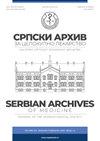Recognition and treatment of mild cognitive impairment in Serbian general practice
IF 0.2
4区 医学
Q4 MEDICINE, GENERAL & INTERNAL
引用次数: 0
Abstract
Introduction/Objective. Mild cognitive impairment (MCI) is a state of progressive cognitive decline, rarely recognized by general practitioners (GPs), which is a reason of late treatment and fast progression towards more serious conditions. The main obstacles for the timely treatment of MCI are lack of diagnostic protocols and clinical guidelines as well as lack of knowledge and disbelief in the pharmacological therapeutic possibilities. The aim of this investigation was to assess level of recognition of MCI symptoms by general practitioners (GPs), and to estimate their perception of distinct risk factors significance for MCI development. Methods. Participants (general practitioners) of the ?Days of General Medicine? Conference (Serbia, March 2018), n = 340, completed 12 items questionnaire about recognition and treatment of the MCI patients. We have used descriptive statistics, Chi-square, Mann-Whitney U tests, binary logistic regression analysis for results presentation, sub-groups comparison, to assess predictors of drug therapy selection, respectively. Results. Study showed GPs recognize diabetes as most important factor for MCI, then hypercholesterolemia, smoking and sedentary behavior, while hypertension and obesity are perceived as less important. Those GPs who estimated diabetes and hypercholesterolemia as more important for all patients are significantly more prone to prescribe symptomatic therapy (pentoxifylline and vinpocetine), p < 0.05 according to Chi-square test. Logistic regression analysis regarding therapy predictions showed that years of GP experience is the most important predictor of drug therapy selection (p < 0.01). Conclusion. Results of this investigation pointed a need for MCI education for young physicians, in order to improve diagnosis and treatment of these patients.塞尔维亚全科医生对轻度认知障碍的认识和治疗
介绍/目标。轻度认知障碍(MCI)是一种进行性认知能力下降的状态,很少被全科医生(gp)认识到,这是治疗晚和向更严重疾病快速发展的原因。及时治疗轻度认知损伤的主要障碍是缺乏诊断方案和临床指南,以及缺乏知识和不相信药物治疗的可能性。本研究的目的是评估全科医生(gp)对MCI症状的认识水平,并估计他们对MCI发展的不同危险因素的认识。方法。全科医生日的参加者(全科医生)Conference(塞尔维亚,2018年3月),n = 340,完成12项MCI患者认知和治疗问卷。我们分别使用描述性统计、卡方检验、Mann-Whitney U检验、结果呈现的二元逻辑回归分析、亚组比较来评估药物治疗选择的预测因素。结果。研究显示,全科医生认为糖尿病是轻度认知障碍的最重要因素,其次是高胆固醇血症、吸烟和久坐行为,而高血压和肥胖被认为不那么重要。认为糖尿病和高胆固醇血症对所有患者更重要的全科医生更倾向于对症治疗(己酮茶碱和长春西汀),经卡方检验p < 0.05。治疗预测的Logistic回归分析显示,全科医生经验年数是药物治疗选择的最重要预测因子(p < 0.01)。结论。本调查结果指出需要对年轻医生进行MCI教育,以提高对这些患者的诊断和治疗。
本文章由计算机程序翻译,如有差异,请以英文原文为准。
求助全文
约1分钟内获得全文
求助全文
来源期刊

Srpski arhiv za celokupno lekarstvo
MEDICINE, GENERAL & INTERNAL-
CiteScore
0.40
自引率
50.00%
发文量
104
审稿时长
4-8 weeks
期刊介绍:
Srpski Arhiv Za Celokupno Lekarstvo (Serbian Archives of Medicine) is the Journal of the Serbian Medical Society, founded in 1872, which publishes articles by the members of the Serbian Medical Society, subscribers, as well as members of other associations of medical and related fields. The Journal publishes: original articles, communications, case reports, review articles, current topics, articles of history of medicine, articles for practitioners, articles related to the language of medicine, articles on medical ethics (clinical ethics, publication ethics, regulatory standards in medicine), congress and scientific meeting reports, professional news, book reviews, texts for "In memory of...", i.e. In memoriam and Promemoria columns, as well as comments and letters to the Editorial Board.
All manuscripts under consideration in the Serbian Archives of Medicine may not be offered or be under consideration for publication elsewhere. Articles must not have been published elsewhere (in part or in full).
 求助内容:
求助内容: 应助结果提醒方式:
应助结果提醒方式:


